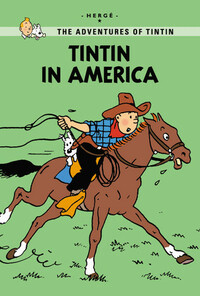Take a photo of a barcode or cover
This book was so lazily written. Everything was soooooo convenient. Tintin should've died, like, ten times. Oh, Tintin's been tied to metal and dropped into the sea? Nevermind. It was accidentally made of wood. Oh, Tintin is tied to railroad tracks? Nevermind. Some lady stopped the train because she saw a puma maul a deer. Tintin needs a way out of the room! Oh, there's a secret door. Tintin needs to find the criminal! Oh, he bumped into him in the desert. It'd be insulting to the reader if it wasn't so goddamn wacky. It's a European's interpretation of America. It's the Prohibition Era with the Old West still kicking. Herge just took everything in American history and said, "This probably all happened around the same time." Fucking Belgian. Tintin's always fun, even when he's extraordinarily lucky and preeeeeetty racist.
I didn't read any TinTin's as a child (I read Peanuts and Asterix mainly, both belonging to the son of my GodFather and read during holidays) and when I started looking in to graphic novels that I should read, I decided that a TinTin should be amongst them. Richard bought me this one for Christmas and I've read it over the last couple of days. It's a nice length, and illustrated really nicely, especially anything featuring Snowy.
A lot of adventures rolled into one story. An enjoyable read but not sure I'll rush to read the rest of them.
A lot of adventures rolled into one story. An enjoyable read but not sure I'll rush to read the rest of them.
It's obviously flawed, but it was a fun read for me as a child.
Overall enjoyed the book - though nothing blew me away, too many coincidences and lucky escapes. Villains are also too stupid - they never wait to ensure the victim is actually dead.
image:
Surprisingly Tintin's archenemy Rastapopoulos first appeared in this book at p57 sitting just beside Tintin in the banquet scene. Though his name wasn't mentioned until the next book Cigars of the Pharaoh.
And thankfully, it contains less animal cruelty and racism compared to Tintin in Congo
image:

Surprisingly Tintin's archenemy Rastapopoulos first appeared in this book at p57 sitting just beside Tintin in the banquet scene. Though his name wasn't mentioned until the next book Cigars of the Pharaoh.
And thankfully, it contains less animal cruelty and racism compared to Tintin in Congo
Nog niet echt een samenhangend verhaal. Duidelijk te merken dat deze is gemaakt om in kranten te publiceren.
fast-paced
You know what? These are fun if you ignore the stereotyping, the repetition and the sometimes offensive humour as as don't expect any relatable (or even half-way likeable) female characters even among the cameos.
This particular one gets 2.5 from me because there is a fantastically sarcastic scene where the minute oil gets found some bastard capitalists turn up to exploit it and the "Indians" get ordered off their own ground, and Tintin is likeable for not being part of that.
I am not ashamed of how much I enjoyed these, especially when I was a child but I still can't give them a lot of stars.
This particular one gets 2.5 from me because there is a fantastically sarcastic scene where the minute oil gets found some bastard capitalists turn up to exploit it and the "Indians" get ordered off their own ground, and Tintin is likeable for not being part of that.
I am not ashamed of how much I enjoyed these, especially when I was a child but I still can't give them a lot of stars.
adventurous
medium-paced
First read this a long time ago - adding it now for posterity.
The author is still finding his way with Tintin in this third installment. It's not as farcical or controversial as the two works before it, but if you can name a cliche about 30s era United States, this book covers it. Greedy capitalists and lurid gangsters abound. No plot to speak of - Tintin arrives in the US and proceeds to take on organised crime, and wins though nobody appreciates his efforts at first. The book also takes aim at Native American land rights, the hypocrisy and uselessness of Prohibition and there's a latent comment in here somewhere that an honest American is a poor American.
A transitional work - not as enjoyable as his later stuff, but there are signs it was coming together.
The author is still finding his way with Tintin in this third installment. It's not as farcical or controversial as the two works before it, but if you can name a cliche about 30s era United States, this book covers it. Greedy capitalists and lurid gangsters abound. No plot to speak of - Tintin arrives in the US and proceeds to take on organised crime, and wins though nobody appreciates his efforts at first. The book also takes aim at Native American land rights, the hypocrisy and uselessness of Prohibition and there's a latent comment in here somewhere that an honest American is a poor American.
A transitional work - not as enjoyable as his later stuff, but there are signs it was coming together.






